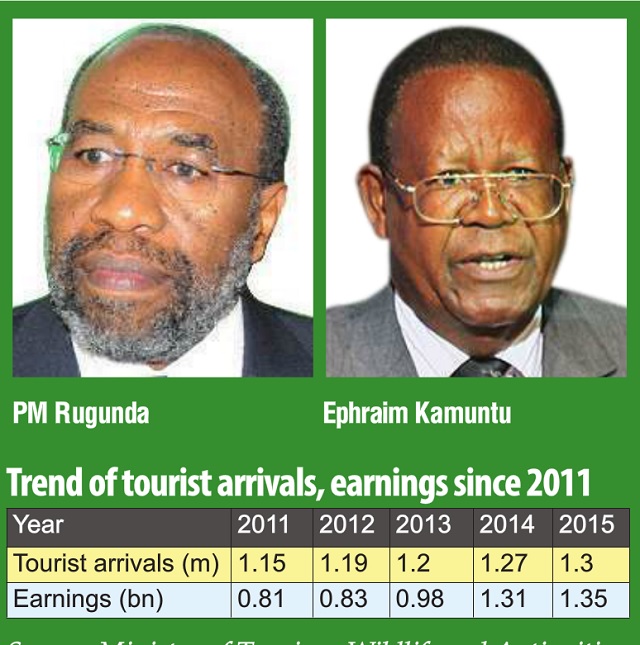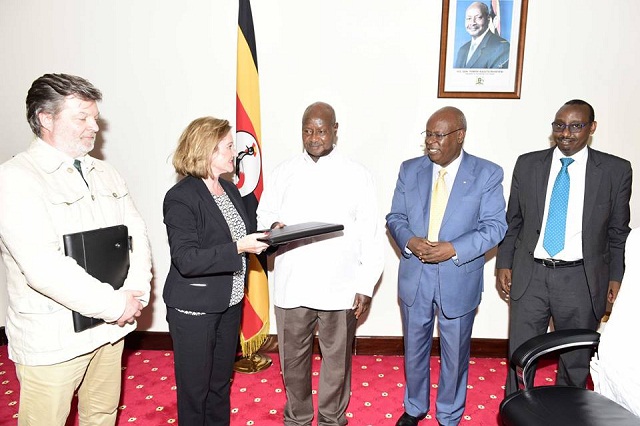
Sliding tourism earnings: Terrorism fears continue to hit tourism industry but stakeholders optimistic about mid term prospects
Latest data from the Ministry of Tourism, Wildlife and Antiquities shows that both tourist arrivals and earnings registered the lowest growth in five years.
Growth in 2015 was at just about 3% in 2015 to reach 1.303 million tourist arrivals and $1.35 billion earnings.
This however shows that tourism remains the country’s leading foreign exchange earner ahead of remittances from the nationals working abroad and coffee, which contributed $1.1 billion and $0.4 billion respectively. Speaking at the annual tourism sector performance review workshop in Kampala on Oct. 20, Patrick Mugoya, the permanent secretary at the ministry, attributed the low growth on various factors.
“In the last financial year, we had the challenges of terror attacks in the region especially Kenya and an Ebola outbreak in West Africa, which affected the sector,” he said. “But with the conditions improving, we hope that we shall post better performance this year.”
Last year, Kenya experienced the worst Al-Shaabab militant attacks in various parts of the country including Garissa Constituent University resulting in the death of more than 147 students, a scenario that saw most of the European countries and US issue travel advisories to their citizens against travelling in the East African region.
This was worsened by the outbreak of the deadly Ebola Virus in West Africa killing hundreds of citizens in Ivory Coast, Cameroon, and Liberia.
However, the African continent remained Uganda’s key tourist market contributing 80% of the tourist arrivals, followed up with Europe at 8%, and a combined America and Asia contributing only 5%.
Tourist arrivals from the neigbhouring countries – Kenya, Rwanda, Tanzania, South Sudan and DRC Congo – accounted for 71% of the tourist arrivals, followed up by the US and UK, which accounted for 4% and 3% respectively.
Mugoya said the government plans to promote local and regional tourism to insulate the industry against ‘bad news’ from other parts of the globe, which eventually affects inflow of foreign tourists.
Kenya’s tourist arrivals also dropped from 1.35 million in 2014 to 1.18 million in 2015 because of the insecurity fears brought about negative travel advisories abroad. Consequently, there was a massive $24.2million reduction in earnings.
Similarly, Tanzania’s tourist arrivals and earnings dropped from 1.14million and $2 billion in 2014 to 1.1 million and $1.93 billion last year.
On the other hand, tourist arrivals in Rwanda shot up from 1.26 million in 2014 to 1.3 million in 2015 as a result of aggressive marketing. This led to a surge in earnings from $305 million to $318 million over the same period.
Prime Minister Dr. Ruhakana Rugunda told the participants that the government is committed to protecting and preserving the country’s ecosystems with a view of utilizing these resources for nature-based tourism, environmental mitigation and sustainable use by communities neighboring protested areas.
“The government will continue with programmes of branding the country and its tourism products, including continuing to work on improving the image of the country,” Dr. Rugunda said adding, “We shall also upgrade the Hotel Tourism Training Institute to international standards to facilitate adequate skilling in the hospitality industry.”
In January this year, the government hired three public relations firms to promote the country’s tourism abroad. They include PHG Consulting (North America), Kamageo (UK and Ireland); and KPRN for the German-speaking European region.
The program is being funded under the World Bank’s Competiveness and Enterprises Development Project (CEDP).

Dr. Rugunda also revealed that the government is to support the Uganda Wildlife Education Centre to establish regional satellite centers to ensure enhanced conservation education and awareness beyond the services offered at the lone centre at Entebbe, adding that the UWEC will also be supported to develop a marina and a tourism circuit on Lake Victoria as part of the domestic and international tourism development.
He also reiterated that government is looking at setting up a national airline with the aim of facilitating the development of Entebbe International Airport into a regional hub to enhance direct connectivity of the country to the major existing and upcoming markets for tourists into the country, and the export of high value agricultural products.
Tourism Minister Ephraim Kamuntu said they also intend to undertake various interventions including enhancing capacity and skills of personnel in the tourism and hospitality industry, and upgrading and redeveloping existing tourism products to increase the sector’s contribution to the economy.
“The interventions are geared towards achieving an average growth rate in the sector of more than 10%,” Kamuntu said, adding that if the status quo is maintained at 3.2%, the country can only achieve a target of 1.48 million visitors by 2020.
He said the ministry is targeting increasing tourist arrivals to 2.1million by 2020, increase visitor expenditure to $2.16 billion, and increase the international visitor stay length from the current six to eight days.
He added that the ministry is also looking at increasing employment opportunities in the tourism sector from the current 1.17 million to 1.98 million jobs in the next four years.
Trend of tourist arrivals, earnings since 2011
| Year | 2011 | 2012 | 2013 | 2014 | 2015 |
| Tourist arrivals (Millions) | 1.15 | 1.19 | 1.2 | 1.27 | 1.3 |
| Earnings (billions) | 0.81 | 0.83 | 0.98 | 1.31 | 1.35 |
Source: Ministry of Tourism, Wildlife and Antiquities
****
editor@independent.co.ug
 The Independent Uganda: You get the Truth we Pay the Price
The Independent Uganda: You get the Truth we Pay the Price



